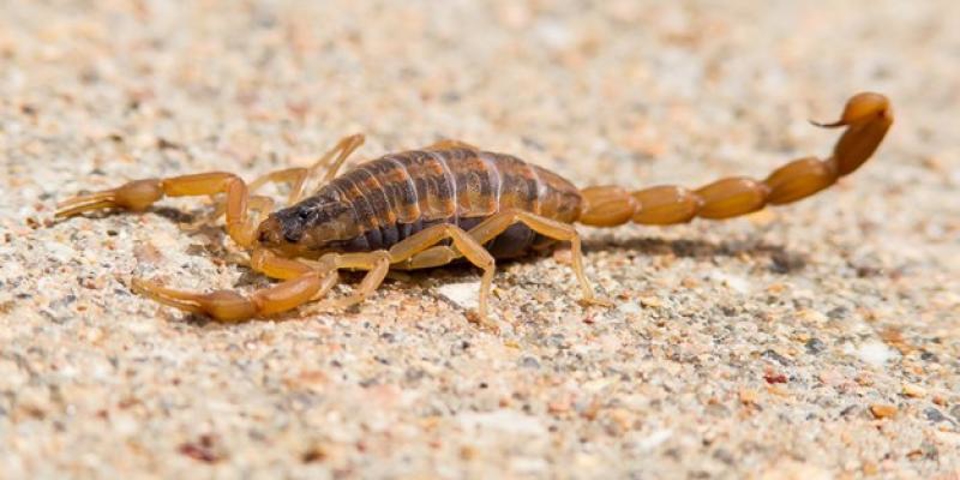What Types of Scorpions Live in Arizona
Arizona is home to 30 species of scorpion. Of these species, four are regularly encountered by humans and, of those, only one is considered dangerous.
Bark Scorpions
Rarely exceeding 3 inches in length, Bark Scorpions are light brown in color which can make them difficult to spot on wood floors or light-colored carpets. Fatalities from their stings are exceedingly rare but are very painful and can cause temporary immobilization of the affected area. Bark Scorpions prey on common pests like beetles, spiders, crickets, and cockroaches and prefer areas of increased humidity, which is why they enjoy residential settings more than other scorpion species.
Arizona Stripetail
Like the Bark Scorpion, the Arizona Stripetail is small (about 3 inches long) but can be distinguished by the vertical brown stripes on its tail and its bulkier pincers. Unlike its cousin though, the Stripetail is not considered dangerous to humans, who are unaffected by its venom. They prefer rocky environments with plenty of hiding places. As they’re also attracted to humidity, it’s not unusual to find them indoors where they will often try to hide in shoes or bags.
Yellow Ground Scorpions
With its slight stature and slender pincers, Yellow Ground Scorpions are easy to misidentify as the Bark Scorpion. The Yellow Ground Scorpion has a slightly wider abdomen and a wider tail at the base and is far more docile than the Bark Scorpion and presents no threat to humans. Still, due to their similar size and appearance, caution should still be exercised in case it’s actually the real thing hiding in your home instead of its mild-mannered relative.
Giant Hairy Desert Scorpions
Arizona’s largest scorpion, the Giant Hairy Desert Scorpion, comes in at a whopping 6 inches in length. Unlike the others on the list, these scorpions dig elaborate burrows in rocky areas and are rarely found indoors. They’re aggressive hunters but their venom is not particularly potent and they pose only a very limited threat to humans.
While most scorpions are harmless to people, their venom can still cause a severe allergic reaction. All stings should be washed quickly and medical attention should be sought immediately if a stung individual is having difficulty breathing.
When is Scorpion Season in Arizona?
Scorpions in Arizona are most active during July and August when temperatures are at their hottest but, as the weather cools down starting in October, they’re more likely to come indoors to escape the cold nights. As Winter sets in, scorpions tend to be less active but they still seek indoor spaces at night. It should be noted that the Bark Scorpion is active all year and, outside of the coldest months, its activity doesn't slow down.
Do Scorpions Nest?
No, scorpions don’t typically build nests. Like spiders, they give birth to live young which they carry on their backs. When they get into your home, they normally find hiding spaces in crowded or undisturbed areas such as in garages and spare rooms or around boxes, bags, or even shoes. They’re also commonly found in rocky and shady areas of your garden, which closely mimics their natural habitat.
How to Get Rid of Scorpions
The best way to get rid of scorpions is to stop them from getting inside to begin with. Scorpions usually get in through holes in screens or loose weather stripping so ensuring that these are in good order, especially as Fall approaches is critical to keeping them outdoors. Regularly using a dehumidifier is also a good defense against scorpions as they’re attracted to moisture.
Limiting outdoor harborages such as piles of rocks, garbage, or firewood removes scorpions’ favorite hiding places in your yard, which is step 1 in preventing them from targeting your home during colder months. Pruning shrubs and trees to limit shade also deters them from colonizing your yard.
When scorpions do get indoors, they can be hard to find. That said, they have one weakness that gives them away. All species of scorpions will glow under a UV light so purchasing a basic UV flashlight gives you a valuable tool in scorpion detection. When you do find scorpions though, it isn’t recommended that you handle them yourself, particularly the Bark Scorpion, in case of stings and possible allergic reactions
Contact Your Local Scorpion Control Professionals
For nearly 15 years, Defense Pest Control has been keeping Arizona’s homes scorpion-free. We use up-to-date, innovative scorpion control techniques in your home and provide recurring services to make sure that, once scorpions are gone, they stay gone. Right now, you can save $50 on our signature scorpion control service so act now before an infestation gets out of hand.





.2104040107139.jpg)